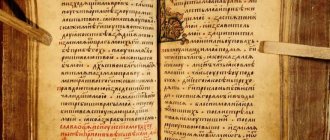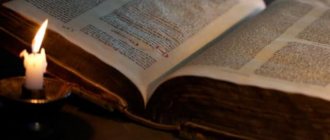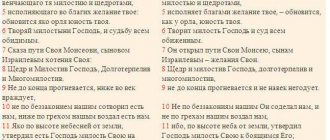Text of prayer Psalm 15
Within the walls of the temple, Psalm 15 is traditionally sung in Church Slavonic. This version of the text is also used for home prayer, but those for whom it is difficult to understand are advised to use the modern translation into Russian.
With accents in Church Slavonic
Translated into Russian
When to read Psalm 58 and how it helps
no comments
From the very first lines of the Christian text of Psalm 58, it becomes clear to the reader that it was written in the most difficult life circumstances. “Deliver me from my enemies, my God! protect me from those who rise up against me,” the psalmist cries out to the One who has more than once saved him from evil troubles and misfortunes. The interpretation of Psalm 58 suggests that its author is the psalmist David, and the reason for its writing was the attempt of the Israeli king Saul to kill King David, as his potential competitor for the throne, by sending an assassin to his house.
In what cases does reading the prayer Psalm 58 help?
A very large part of the history of the church is associated with the name of the psalmist David, and the events associated with the circumstances of his life have been studied quite well. It is known that at the moment described in the text of the Orthodox Psalm 58, he escaped death thanks to his wife Michal, who helped him go down from the window and hide from his pursuers, and this incident further strengthened his faith in the Lord. Listen online and read Christian Psalm 58 about people who have lost their speech, so that God will restore their ability to speak.
Read the Orthodox text of Psalm 58 in Russian
To the head of the choir. Don't destroy it. The Scripture of David, when Saul sent to keep his house to kill him.
Deliver me from my enemies, my God! protect me from those who rise up against me; deliver me from the workers of iniquity; save me from the bloodthirsty, for behold, they lie in wait for my soul; The mighty are gathered against me, not because of my transgression and not because of my sin, O Lord; without my fault they come running and arm themselves; move to help me and look. Thou, O Lord, God of hosts, God of Israel, arise to visit all nations, spare not one of the wicked wicked: in the evening they return, howl like dogs, and walk around the city; behold, they spew out blasphemy with their tongues; swords are in their mouths: “for,” they think, “who can hear?” But You, Lord, will laugh at them; You will put all nations to shame. They have the power, but I resort to You, for God is my intercessor. My battle, which has mercy on me, will precede me; God will allow me to look at my enemies. Do not kill them, lest my people forget; scatter them with Thy power and overthrow them, O Lord our protector. The word of their tongue is the sin of their lips, so that they may be caught in their pride for the oath and lies that they utter. Waste them in anger, waste them so that they do not exist; and let them know that God rules over Jacob to the ends of the earth. Let them return in the evening, howl like dogs, and walk around the city; let them wander to find food, and let the unfed pass the night. And I will sing Your power and proclaim Your mercy from early morning, for You were my protection and refuge in the day of my distress. My strength! I will sing praises to you, for God is my intercessor, my God who has mercy on me.
Christian Psalter, text of Psalm 58 in Church Slavonic language
Deliver me from my enemies, O God, and deliver me from those who rise up against me; deliver me from the workers of iniquity, and save me from the men of blood. For behold, having caught my soul, the mighty ones attacked me; Below is my iniquity, below is my sin, Lord; without iniquity we have flown and corrected; arise to meet me and see. And you, Lord God of hosts, God of Israel, visit all languages; Let not all who practice iniquity have mercy. They will return in the evening, and will hunger like a dog, and will go through the city. Behold, they answer with their mouth, and the sword is in their mouth; like who is listening? And you, Lord, laugh at them and abase all languages. I will preserve my power for you; for you, O God, are my intercessor. My God, His mercy will go before me; My God will show me against my evils. Do not kill them, lest they forget your law; squander thy power and bring down, O Lord, my protector, the sin of their lips, the word of their lips; and let them be in their pride, and from oaths and lies they will be proclaimed in death, in the wrath of death, and they will not be; and they will know that God rules over Jacob and the ends of the earth. They will return in the evening, and will hunger like a dog, and will go through the city; and the food will be scattered; If they don’t get enough, they will grumble. I will sing of your strength and rejoice in the morning about your mercy; for you were my intercessor and my refuge in the day of my tribulation. You are my helper, I sing to you; For God is my intercessor, my God, my mercy.
We advise you to study Prayers to get pregnant
History of writing
The content of the 15th Psalm contains an indication of the time of its composition. The second verse of the work says that the Lord demands “good” from the king. Here this word must be interpreted as sacrifices, which are the obligatory and most important basis of the Old Testament cult. An important indication is also present in the lines of the third verse of the psalm. Here the word “saints” is interpreted as “Jews,” the people chosen by the Most High, called by Him to serve and making a great vow to Him.
Psalm 15 is a work in which the author separates himself from his people who lived on God’s earth, in other words, in Palestine, assigned to him by heaven. Given this, it can be assumed that the king wrote a song of praise while staying outside Palestine. The fourth verse reflects the wickedness of everyone around, David himself has nothing to do with it.
Separated from the Jews, surrounded by pagans, the prophet does not have the opportunity to offer sacrifices to the Lord. These events correspond to the time when David lived under Saul and was then forced to flee his persecution. He found salvation from Ahnusu in Ziklag, from the king of the Philistines. Confirmation of this is present in the 1st book of Samuel (27:1-7).
About daily reading of the Six Psalms
It is recommended to read the Six Psalms daily, that is, Psalms 3, 37, 62, 87, 102, 142.
Six Psalms (Exapsalms)
Six Psalms
- These are six psalms that are read at the beginning of Matins.
The Six Psalms begins with a doxology: Glory to God in the highest,
and a prayer:
Lord, open my lips.
During the sixth psalm and at the end of it, the Holy Trinity is glorified with threefold
alleluia.
The psalms that make up the sixth psalm are so touching, their content is so close to us (they depict, on the one hand, the greatness of God and the abundance of His benefits to man, on the other, the insignificance and sinfulness of man), that the Holy Church pays special attention to our for this reading. The charter says that during this reading “no one has the power to create whispers, even spit or spit; but more than anything, listen to the words spoken by the psalmist, with his hands bent towards his chest, his heads bowed, and his eyes down (lowered to the ground), with his heart eyes looking towards the east, praying for our sins, remembering death, and future torment, and eternal life.”
To arouse greater attention in the worshipers, when reading the shestop-salmiya, the charter commands to extinguish the candles and remain in the light of the lamps.
Psalm 3
This psalm is the first of the so-called six psalms, which is part of Matins, and its purpose is to give thanks to God for preserving life during the past night with a prayer for the sending of prosperity in the coming day, with which this psalm is in agreement (I go to bed, I sleep, I get up... Arise, Lord! Save me
…)
Psalm 37
This psalm occupies second place in the six psalms. Through the words of this psalm, each believer brings repentance before God of his sinfulness with a confession of complete submission in devotion to His will (v. 16). The man here expresses a desire in the coming day to make amends for the evil deeds he has done (v. 19).
Psalm 62
Psalm 62 occupies third place in the sixth psalm, composing a prayer to God at the coming of the day so that it (the prayer) will be pleasing to God (v. 6
) and that the Lord would accept the one praying under “the shadow of His wings” (v.
8
) throughout the coming day.
Psalm 87
This is the fourth psalm in the sixth psalm. The darkness of the night resembles hell, sleep resembles death. The purpose of this psalm in the morning service: before the onset of the day, the Church reminds a person of the need for effort on his part to avoid rejection from God, which is possible only with the help of God and prayer to Him (vv. 5, 14), so as not to be subjected to eternal night, eternal death.
Psalm 102
The fifth psalm in the sixth psalm shows an image of God’s merciful attitude towards man and is distinguished by its extraordinary touchingness.
Psalm 142
This psalm is the last in the sixth psalm. Having strengthened a person in the hope of receiving salvation (Ps. 102), the Church, on behalf of the believers, prays to God to show him the path of action (v. 8
), teach him to do His will and make him worthy
of the land of righteousness
(v.
10
).
The meaning of Psalm 15
Despite the completeness of the development of David’s thoughts, they are all expressed briefly. This, combined with the lack of clarity of the work, is the reason why this eulogy is considered one of the most difficult to understand. To get to the bottom of its meaning, it is necessary to carefully analyze the individual verses of the prayer:
Verse 1: At the beginning of Psalm 15, David repeats a thought found in most of his writings. It is as follows: his faith in God is deep, unshakable, his devotion to the Almighty cannot be doubted. The king emphasizes that all his life he trusted in the Lord, seeing in him the only hope for salvation. Finding himself far from the Jews, surrounded by pagans who were strangers to him by blood and faith, he waited for help from above.
Verse 2: David mentions “good things,” which, as stated above, involve sacrifices. These are intended to awaken in a person an awareness of his sins, guilt before God, and awaken a desire to be reconciled with Him. The Lord does not expect sacrifices from the king; he wants the prophet to serve him with his being, that is, with his deeds and thoughts.
Verse 3: We are talking about the “saints,” that is, about the Jewish people chosen by the Almighty, who are under His protection and guidance. The Jews, called to be saints, received the gift of “land”, Palestine, “wonderful”, in other words, priests, had the honor of being greatly respected by the people. The king, speaking about his native land, blood, true shepherds, clearly misses them.
Verses 4 and 5: The only true Lord is Jehovah, only those who believe in Him can expect favors from above. David emphasizes that “tribulation” awaits others who believe in foreign gods. This word means deprivation.
Verse 6: In this part of the work the phrase “my boundaries” is found, which is interpreted as “my possessions” or “my “borders”. Such are dear to David.
Verse 7: The content of this verse suggests that, while surrounded by the Philistines, the king received a revelation from the Most High, by which he “was admonished.”
Verse 8: The author feels the help of God, with His support he avoids misfortune and failure. Finding himself far from his homeland, among the pagans, he continues to believe in salvation.
Verses 9 and 10: The thought of the constant protection of the Almighty is for David a source of bright joy, which he was unable to hide (the words “my tongue rejoiced” speak of its external manifestations). The support of the Lord instilled in him sincere faith that his body was not in danger of decay, he would remain alive.
This hope, as we know, thanks to the testimony in the book of Acts (2:29, 13:36), was not realized. The king died, like any mortal, his body decayed. Given this, some experts suspect that the above lines do not refer to David, but to Christ, his resurrection.
Verse 11: At the end of the song of praise, the author summarizes everything that has been said previously, emphasizing the joy that communication with the Almighty brings him.
About arranging family life
1. About the longevity of the owner of the family and those family members without whom others cannot do:
Ps. 86
2. So that the Lord bless the property of people, so that they do not fall into despondency, but glorify God:
Ps. 103
3. May love remain in the family and may they glorify God:
Ps.116
4. When there is no mutual understanding between parents and children, may the Lord enlighten them so that children obey their parents and parents love their children:
Ps. 76
5. May the Lord bring peace to the family if there is a quarrel:
Ps.126
6. For younger people to respect their elders:
Ps. 109
7. About pacifying disobedient children so that they do not upset their parents:
Ps. 22
8. About a mother who is afraid during childbirth, may the Lord strengthen and protect her:
Ps. 75
9. May the Lord protect a pregnant woman so that she does not lose her fetus:
Ps. 142
10. Young people, when they suffer from unhappy love:
Ps. 41
11. To barren spouses, so that the Lord heals them and they do not divorce:
Ps. 19




